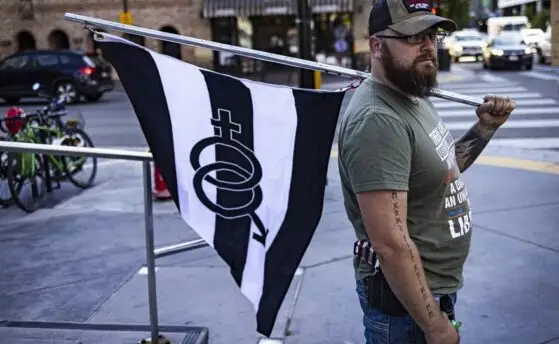One Radical Opinion | Suicide Solution
Those of us of a certain age remember the movie “Old Yeller”. For the young’uns out there, it’s the age-old story of a boy and his dog, a golden retriever named “Old Yeller”. The dog contracts rabies and the boy learns the lesson of life and death. His dog gets progressively sicker, growling and whining in pain, until the boy is forced to put the dog out of its misery with a rifle shot.
If the Bush Administration has its way at the Supreme Court, old, sick, pain-ridden humans will no longer get the same consideration we would give Old Yeller. An act of humane relief that wouldn’t be given a second thought in the case of a disease-ridden animal in agony will be once again forbidden for humans in Oregon.
In 1994, Oregon became the first state in the nation to pass a physician-assisted suicide law. The law, passed by citizen initiative and reaffirmed in 1997, allows a terminally ill patient to obtain a prescription for drugs that will end his or her life. There are many checks and balances written into the law, such as mandatory review of the patient’s case by two independent physicians and a requirement that the patient’s condition is terminal and the patient is suffering from chronic pain. Since its inception, 174 Oregonians, with the help of their doctor, have chosen to end the pain and depart this life with some dignity and relief. An average of about 18 people a year hardly seems like a law that is being abused.
The case came to the Supreme Court by way of an appeal from then-Attorney General John Ashcroft. His office maintained that because of the Controlled Substances Act, the federal government has the ultimate authority to regulate how doctors prescribe drugs to patients, regardless of what the governments or the voters in the states may decide. Prescribing drugs to end a life, he argued, is an act that has no legitimate medical purpose, and drugs that have no medical purpose should never be administered, prescription or not.
It’s an odd coincidence that this appeal comes during a week that begun with Hunter S. Thompson’s suicide. This may be the most ironic part of the issue; if you are of sound mind and body and have a gun handy, nothing can stop you from ending your life in a way that is very gory and emotionally damaging to your family. However, if you are a bedridden invalid in chronic pain, a doctor is required to keep you hanging on for every agonizing last moment even if your desperate wish is to just painlessly end it all.
What possible gain could there be from preventing doctors from helping patients fulfill their wishes? The suicide opponents would tell you about respecting the “culture of life”, about how life is sacred and how doctors should always attempt to prolong life, not end it. You can also detect the influence of religious opinion coloring their judgment on the issue; they speak of suicide in the moralistic hues of sin rather than impartially examining whether humans have a right to decide to meet death on their own terms.
But it’s more than religion alone that fuels the opposition to physician-assisted suicide. You need only follow the money to understand the real reasons the Bush Administration wants to keep you breathing against your will.
If you look at the figures for an average person’s lifetime medical costs, you’ll find that the great majority of costs accrue during the very last few months of life. Round-the clock intensive care and dozens of expensive prescriptions will quickly bankrupt even the largest accounts. We can’t have a doctor prescribing just one life-ending injection when that patient might be good for another six months of prescriptions and hospital stay.
In addition, we can’t have the states making their own decisions regarding which drugs doctors can prescribe to their patients. There is already a standoff between the ten states that allow doctors to prescribe marijuana and the federal government that believes marijuana has no medicinal value. If the court decides that Oregon doctors can prescribe life-ending drugs, it sets a precedent that the states, not the federal government, can decide the meaning of “legitimate medical purposes”, and gives more ammunition to the states that have decided that marijuana has “legitimate medical purposes”.
This issue seems especially odd when you consider the rising popularity of “living wills”, where a person can assert that they wish no “heroic measures” to be undertaken to prolong their life. A person can dictate a “do not resuscitate” order. Under such guidelines, if a person becomes so injured or ill that it would take a machine to maintain breathing, a tube to continue feeding, or a defibrillator to keep the heart beating, the doctors must forgo those measures and allow the person to die.
Therefore, if you’re sick enough to die immediately without help, you’re allowed to pass on according to your wishes. However, if you’re only sick enough to be condemned to a painful death in a few months, you’re forbidden the help necessary to pass on according to your wishes. Doctors can be prevented from keeping you alive, but they can’t be allowed to help you die.
The opposition to a person’s right to die has always baffled me. If you do not have the freedom to live your life and control your body in the manner of your choosing, including the very last moment of its existence, then you are not truly free. It’s a point the late Dr. Thompson and I have always agreed on. There’s something more important than Bush’s supposed “culture of life” and that is quality of life.
Unfortunately, the way the Controlled Substances Act is written, I do not anticipate a ruling in Oregon’s favor. It will be a shame if terminally ill Oregonians are forced to suffer a few more months of pain solely because John Ashcroft wanted to protect drug company profits.






